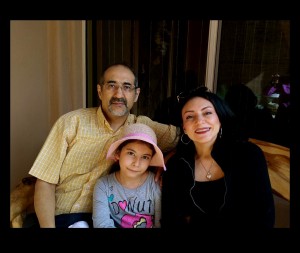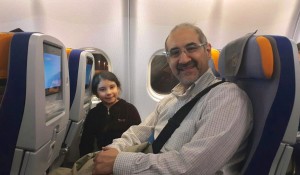In a cover story for Foreign Policy magazine, Kian’s friend Karim Sadjadpour considers Kian’s detention and sentencing and questions “why Iran’s rulers imprison people they know are innocent”:
“My friend, the Iranian-American scholar Kian Tajbakhsh, was recently sentenced to 15 years in Tehran’s Evin prison. For those familiar with the ways of authoritarian regimes, the charges against him will ring familiar: espionage, cooperating with an enemy government, and endangering national security.
Since his arrest last July — he was accused of helping to plan the post-election uprisings — Kian’s family and friends have made countless appeals for clemency to the Iranian government, written letters to Supreme Leader Ayatollah Ali Khamenei and President Mahmoud Ahmadinejad pleading his innocence, and signed dozens of petitions. All to no avail.
I’ve come now to realize that the regime probably thinks we’re obtuse. Indeed, they know better than anyone that Kian is an innocent man. As the expression goes in Persian, “da’va sar-e een neest,” i.e. that’s not what this fight is about.
Allow me to explain.
Kian was first arrested in 2007. His crime was having previously worked as a consultant for the Open Society Institute (OSI), a U.S.-based NGO. Though his work was nonpolitical, focused on educational and developmental projects, and had received the explicit consent of the Iranian government, he was accused of trying to foment a “velvet revolution” on behalf of U.S. intelligence agencies.
While in solitary confinement in Evin, he was subjected to countless hours of interrogation. Had the authorities found any evidence for the above charges during all this, Kian certainly would not have been freed after four months.
He was permitted to leave the country after his release, but chose to remain in Tehran with his wife and newborn daughter. He reassured his worried family and friends that he was now an open book to the Iranian government and there could be no further rationale or pretext to detain him.
Over the last two years, he regularly met with his minder from the Ministry of Intelligence. Aware of the fact that the government was monitoring all of his activities and communications — including e-mail and telephone conversations — he kept a very low profile and exhibited great caution.
During this period, Kian and I regularly exchanged e-mails. He urged me to read his favorite book, Polish writer Czeslaw Milosz’s brilliant novel, The Captive Mind, which examines the moral and intellectual conflicts faced by men and women living under totalitarianism of the left or right.
On the 30th anniversary of the fall of the shah we debated the successes and failures of the 1979 Islamic Revolution, and he told me he believed that the former outweigh the latter. Hardly the worldview of a subversive counterrevolutionary.
Even amid the massive popular uprisings following the tainted June 2009 presidential elections, Kian remained cautious and unmoved, steering way clear of any political activity and continuing to meet with his minder.
On June 14, two days after the election, he wrote me an email saying, “I’m keeping my head down … I have nothing to add to all the reports that are here.” In the same e-mail, Kian even expressed skepticism about the opposition’s accusations of electoral fraud, saying he had seen “little hard evidence.”
A few weeks later he was arrested, bafflingly, on charges of helping to plan the post-election unrest.
Given the government’s intimate familiarity with the benign nature of Kian’s activities and communications, it appeared he was simply needed as an unfortunate pawn in the regime’s campaign to portray indigenous popular protests as orchestrated by foreign powers. Though the unrest gradually subsided, we went from counting Kian’s detention in days to weeks to months.
Along with dozens of other prisoners, dressed in pajamas and sandals, he was forced to participate in humiliating show-trials that were broadcast on official state television. Hard-liners used Kian to attack their reformist opponents, inventing fantastic claims that he was the link between former President Mohammed Khatami and OSI founder George Soros.
Though his face looked visibly different, haggard, his two-year old daughter Hasti ran and kissed the television screen when she saw his image. His wife sobbed.
When our courageous mutual friend, Canadian-Iranian Newsweek reporter Maziar Bahari, was finally released from Evin after four months, we thought it boded well for Kian. These hopes were dashed by Tuesday’s almost comically harsh sentence. 15 years!
The over-the-top severity of the sentence makes it eminently clear that this case really has little to do with Kian, and everything to do with Iran’s negotiating posture toward the United States. A disaffected contact in the Iranian foreign ministry — the vast majority of whom were thought to have voted for Mir Hossein Mousavi — bluntly confirmed my suspicions. “Eena daran bazi mikonan,” he told me. “These guys are just playing.”
While neighboring Dubai and Turkey have managed to build thriving economies by trading in goods and services, Iran, even 30 years after the revolution, remains in the business of trading in human beings. In addition to Kian, Iran is now holding at least five other American citizens against their will, including three young hikers — Shane Bauer, Sarah Shourd, and Josh Fattal (an outspoken Palestinian-rights activist) — detained in June along the Iran-Iraq border in Kurdistan.
What, if anything, Tehran seeks in return for these human subjects is unclear, and frankly it’s a difficult issue for Iran to broach, given that it undermines the accusations the regime has concocted. That said, the official line can often change abruptly, and for no apparent reason. After Iranian-American journalist Roxana Saberi was sentenced last year to eight years in prison (on preposterous charges of espionage), she was summarily released a few weeks later.
Until recently, it was accepted wisdom that the uptick in Tehran’s repression of its own citizenry and detention of U.S. nationals was merely a reaction to the hostile policies of the Bush administration. This thesis is being quickly disproven as the Obama administration’s hands-off approach to human rights in Iran proves equally unsuccessful in getting the regime to improve its practices.
Whether Republic or Democrat, U.S. officials are often puzzled by the detention of dual nationals, and unsure how to react to them. Do U.S. statements and/or diplomatic efforts help or hurt the cause of the detainees?
Based on the experience of several Iranian-Americans who have served time in Evin — including esteemed scholar Haleh Esfandiari, Saberi, and peace activist Ali Shakeri — we know that thoughtful public statements from U.S. officials coupled with behind-the scenes intervention were helpful to their cause.
But these are individual cases. What U.S. policy measures could help improve the overall human rights situation in Iran, and prevent further detentions from taking place in the future?
Broadly speaking, I support the argument — made mostly by the American left — that expanding and improving ties between Washington and Tehran would help mitigate the detention of innocents in Iran — whether Iranian or American.
I also agree with the counterargument, made mostly by the right, that Tehran’s hard-liners use continued enmity with the United States in order to blame Washington when, among other things, their population rises up, economic malaise worsens, or a terrorist attack happens in Baluchistan.
Unfortunately, the difficulty of potential engagement has increased significantly in recent months as any remaining moderates and pragmatists have essentially been purged from the Iranian government’s power structure. The color spectrum of the regime now ranges from pitch black to dark grey. And insofar as the continued detention of U.S. citizens in Tehran decreases the likelihood of a diplomatic breakthrough with Washington, the interests of at least some of these hard-liners will be served.
Sadly, languishing in Evin prison, my friend Kian understands this dynamic only too well.
Shortly after President Obama’s speech in Cairo last June, Kian wrote, “Iranians might ponder Barack Obama’s challenge to Iran to articulate ‘not what it is against, but what future it wants to build.’ Each Iranian will wonder how much thought our rulers or our fellow countrymen have given to this critical question and why answers to it are so vague and so few.”


 Sting makes appeal for Kian Tajbakhsh and Iranian detainees.
Sting makes appeal for Kian Tajbakhsh and Iranian detainees.